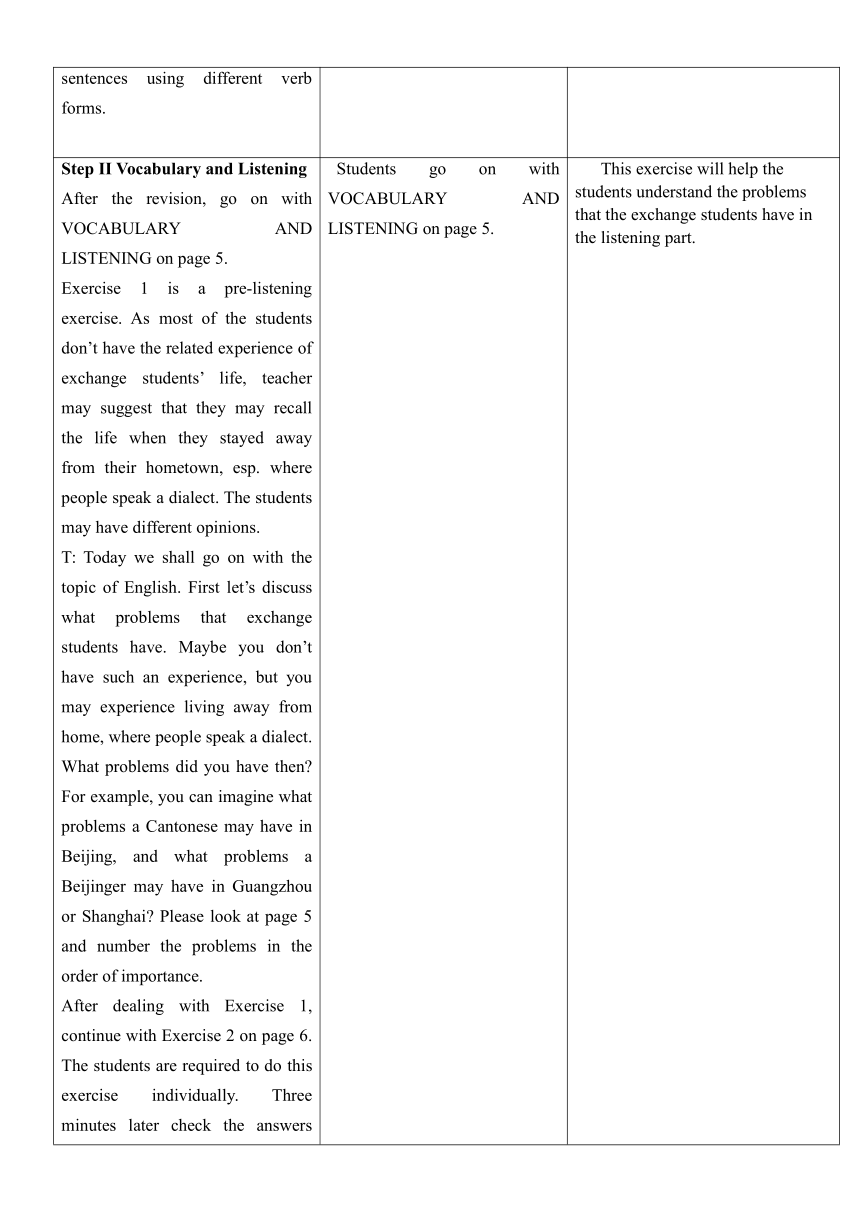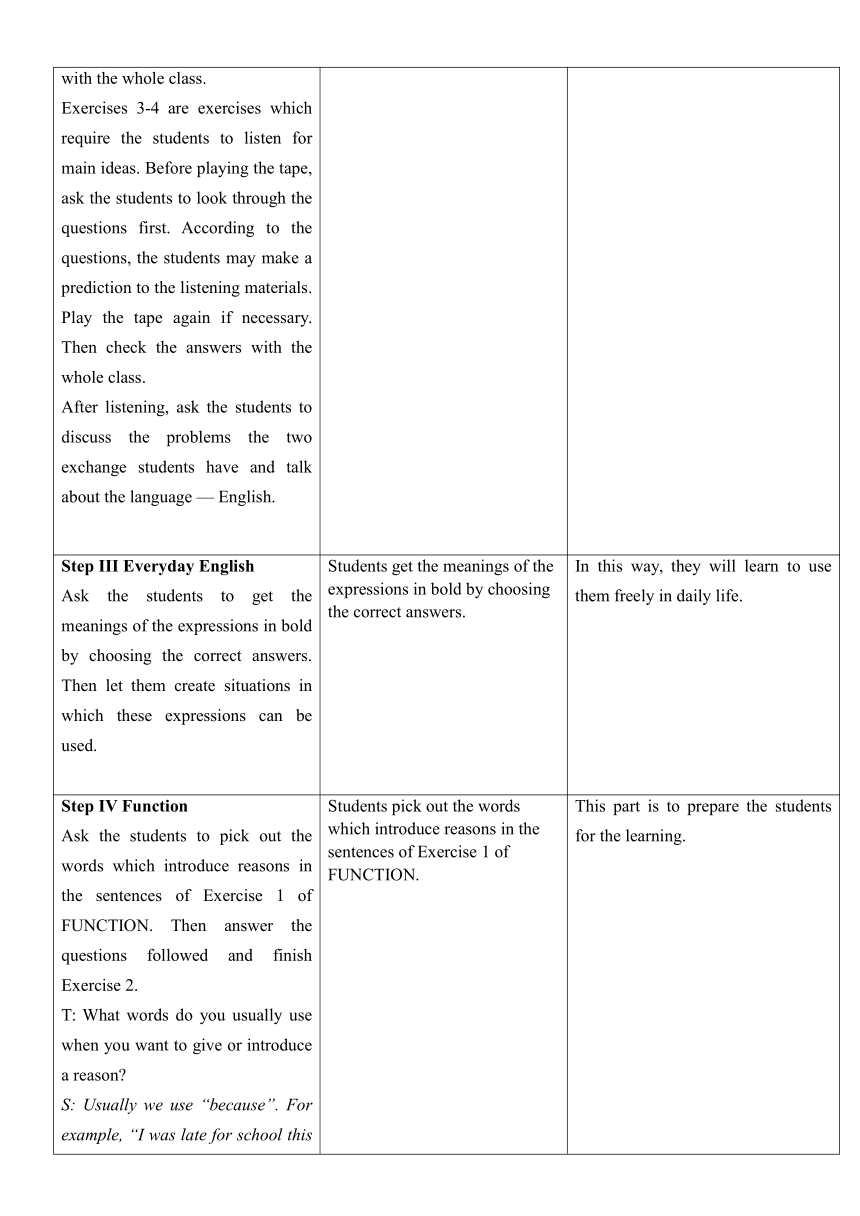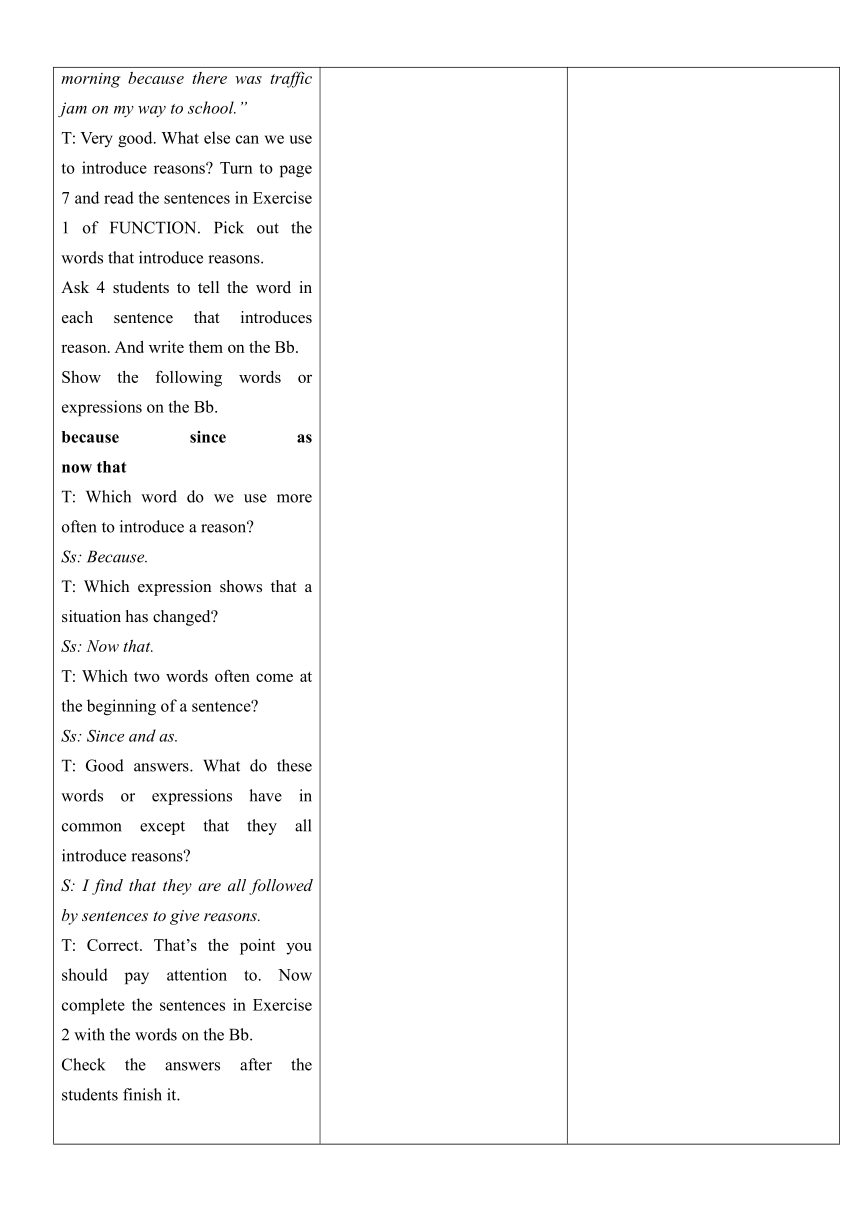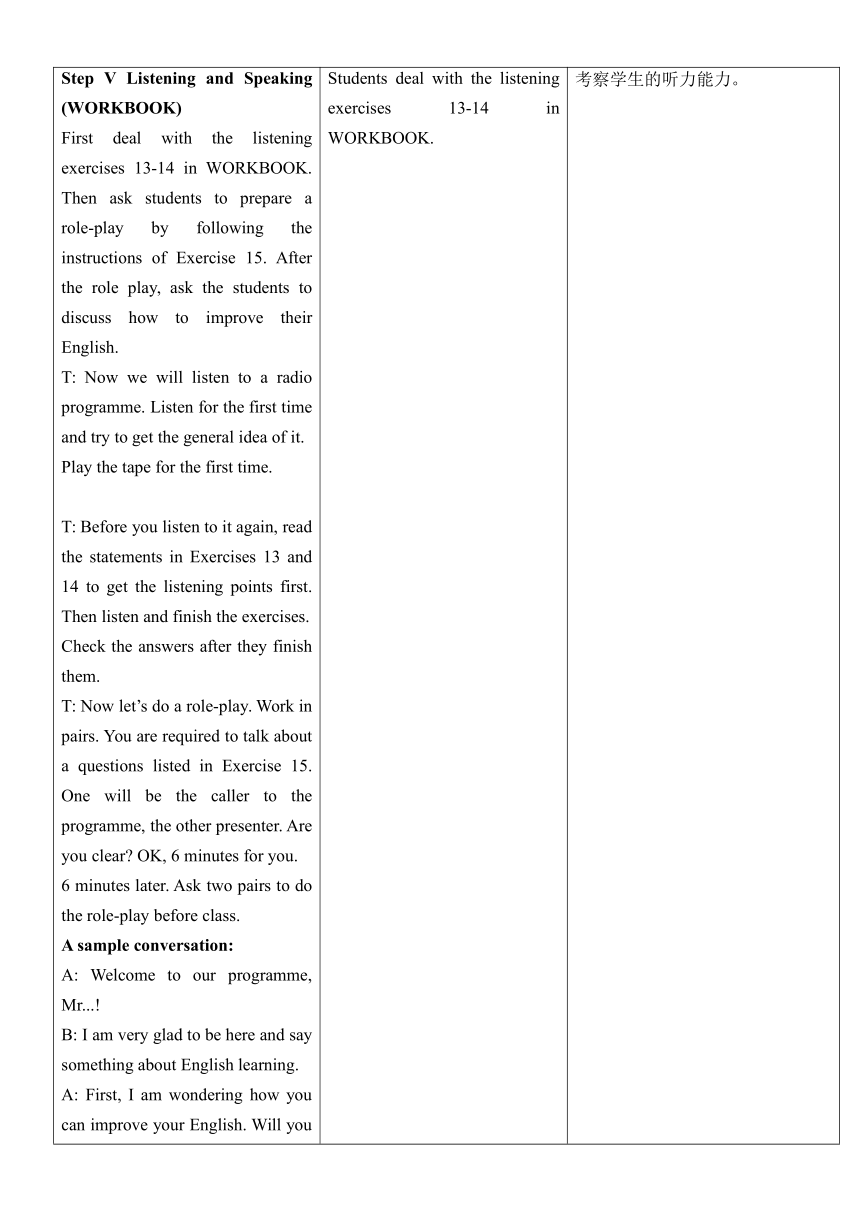外研版必修五Module 1 British and American English-Listening andSpeaking-教学设计-
文档属性
| 名称 | 外研版必修五Module 1 British and American English-Listening andSpeaking-教学设计- |

|
|
| 格式 | zip | ||
| 文件大小 | 54.5KB | ||
| 资源类型 | 教案 | ||
| 版本资源 | 外研版 | ||
| 科目 | 英语 | ||
| 更新时间 | 2022-11-30 00:18:19 | ||
图片预览





文档简介
教学设计
课题: Book5 Module 1 British and American English
科目: 英语 教学对象: 高一年级 课时: 1课时 Listening and Speaking
授课教师
一、教学内容分析
本模块以British and American English为话题,从听说读写等方面谈论了英国英语和美国英语的异同,并对英语的发展趋势作了概括。文中最后总结不论讲哪种英语,沟通交流是目的,只要人们相互理解,哪种英语都不重要,所以将来会有很多种英语,而不是只有英国英语和美国英语。
二、教学目标
a. 重点词汇和短语announcement, linguistics, edition, cute, get used to something, so far, a couple of, wear off, pick up (an accent), make a fuss of someoneb. 重点句式I like ... because...Since English is spoken all over the world,...As I was the only British person in the school,...I’m getting on just fine, now that...2. Ability goals 能力目标Listen to people talking about problems that exchange students have. 3. Learning ability goals学能目标Enable the students to learn the problems that exchange students have by listening to some material.
Teaching important points教学重点Vocabulary and Everyday English.Teaching difficult points教学难点How to give reasons by using the patterns in target language.
六、教学过程
教师活动 学生活动 设计意图
Step I RevisionCheck the homework. Ask some students to make some sentences using different verb forms. Students answer questions. For this exercise, teachers can check the answers together.
Step II Vocabulary and ListeningAfter the revision, go on with VOCABULARY AND LISTENING on page 5.Exercise 1 is a pre-listening exercise. As most of the students don’t have the related experience of exchange students’ life, teacher may suggest that they may recall the life when they stayed away from their hometown, esp. where people speak a dialect. The students may have different opinions.T: Today we shall go on with the topic of English. First let’s discuss what problems that exchange students have. Maybe you don’t have such an experience, but you may experience living away from home, where people speak a dialect. What problems did you have then For example, you can imagine what problems a Cantonese may have in Beijing, and what problems a Beijinger may have in Guangzhou or Shanghai Please look at page 5 and number the problems in the order of importance. After dealing with Exercise 1, continue with Exercise 2 on page 6. The students are required to do this exercise individually. Three minutes later check the answers with the whole class.Exercises 3-4 are exercises which require the students to listen for main ideas. Before playing the tape, ask the students to look through the questions first. According to the questions, the students may make a prediction to the listening materials. Play the tape again if necessary. Then check the answers with the whole class.After listening, ask the students to discuss the problems the two exchange students have and talk about the language — English. Students go on with VOCABULARY AND LISTENING on page 5. This exercise will help the students understand the problems that the exchange students have in the listening part.
Step III Everyday English Ask the students to get the meanings of the expressions in bold by choosing the correct answers. Then let them create situations in which these expressions can be used. Students get the meanings of the expressions in bold by choosing the correct answers. In this way, they will learn to use them freely in daily life.
Step IV FunctionAsk the students to pick out the words which introduce reasons in the sentences of Exercise 1 of FUNCTION. Then answer the questions followed and finish Exercise 2.T: What words do you usually use when you want to give or introduce a reason S: Usually we use “because”. For example, “I was late for school this morning because there was traffic jam on my way to school.”T: Very good. What else can we use to introduce reasons Turn to page 7 and read the sentences in Exercise 1 of FUNCTION. Pick out the words that introduce reasons.Ask 4 students to tell the word in each sentence that introduces reason. And write them on the Bb.Show the following words or expressions on the Bb.because since as now thatT: Which word do we use more often to introduce a reason Ss: Because.T: Which expression shows that a situation has changed Ss: Now that.T: Which two words often come at the beginning of a sentence Ss: Since and as. T: Good answers. What do these words or expressions have in common except that they all introduce reasons S: I find that they are all followed by sentences to give reasons.T: Correct. That’s the point you should pay attention to. Now complete the sentences in Exercise 2 with the words on the Bb.Check the answers after the students finish it. Students pick out the words which introduce reasons in the sentences of Exercise 1 of FUNCTION. This part is to prepare the students for the learning.
Step V Listening and Speaking (WORKBOOK)First deal with the listening exercises 13-14 in WORKBOOK. Then ask students to prepare a role-play by following the instructions of Exercise 15. After the role play, ask the students to discuss how to improve their English. T: Now we will listen to a radio programme. Listen for the first time and try to get the general idea of it.Play the tape for the first time.T: Before you listen to it again, read the statements in Exercises 13 and 14 to get the listening points first. Then listen and finish the exercises.Check the answers after they finish them.T: Now let’s do a role-play. Work in pairs. You are required to talk about a questions listed in Exercise 15. One will be the caller to the programme, the other presenter. Are you clear OK, 6 minutes for you.6 minutes later. Ask two pairs to do the role-play before class.A sample conversation:A: Welcome to our programme, Mr...!B: I am very glad to be here and say something about English learning.A: First, I am wondering how you can improve your English. Will you give some advice to our English learners B: I think the most important thing is to get interested in the language. If you have no interest in it, how can you be expected to learn it well A: Since there are varieties of English such as British English, American English, Australian English and so on, which accent should the learners adopt Which accent do you prefer B: It doesn’t make much of a difference whether you speak British English or American English. If people can understand each other, that’s OK. I prefer American English.A: Why are so many people learning English B: The reason is simple. English is becoming official language in many countries. English is also the working language in many international corporations. A: Last question. Are there many differences between American English and British English B: American English and British English are different in several ways. For example, vocabulary, spelling, grammar and pronunciation. But it’s not a problem for people from America and Britain to communicate with each other. Nowadays, the two varieties are moving closer and closer. A: Thanks for your wonderful explanations and answers. T: OK, here are some tips from an expert. I hope you will find them useful and put some of them into practice. I’m sure you will make great progress. Good luck to your English studies!Distribute the following handouts to the students.How to Learn English!Here are some tips which may help you to master the English Language!Speak without Fear The biggest problem most people face in learning a new language is their own fear. They worry that they won’t say things correctly or that they will look stupid so they don’t talk at all. Don’t do this. The fastest way to learn anything is to do it — again and again until you get it right. Like anything, learning English requires practice. Don’t let a little fear stop you from getting what you want. Use All of Your Resources Even if you study English at a language school it doesn’t mean you can’t learn outside of class. Using as many different sources, methods and tools as possible, will allow you to learn faster. There are many different ways you can improve your English, so don’t limit yourself to only one or two. The Internet is a fantastic resource for virtually anything, but for the language learner it’s perfect. Surround Yourself with English The absolute best way to learn English is to surround you with it. Take notes in English, put English books around your room, and listen to English language radio broadcasts, watch English news, movies and television. Speak English with your friends whenever you can. The more English material that you have around you, the faster you will learn and the more likely it is that you will begin “thinking in English”. Listen to Native Speakers As Much As Possible There are some good English teachers that have had to learn English as a second language before they could teach it. However, there are several reasons why many of the best schools prefer to hire native English speakers. One of the reasons is that native speakers have a natural flow to their speech that students of English should try to imitate. The closer ESL / EFL students can get to this rhythm or flow, the more convincing and comfortable they will become. Watch English Films and Television This is not only a fun way to learn but it is also very effective. By watching English films (especially those with English subtitles) you can expand your vocabulary and hear the flow of speech from the actors. If you listen to the news you can also hear different accents. Listen to English Music Music can be a very effective method of learning English. In fact, it is often used as a way of improving comprehension. The best way to learn though is to get the lyrics (words) to the songs you are listening to and try to read them as the artist sings. There are several good Internet sites where one can find the words for most songs. This way you can practice your listening and reading at the same time. And if you like to sing, fine. Study As Often As Possible! Only by studying things like grammar and vocabulary and doing exercises, can you really improve your knowledge of any language. Do Exercises and Take TestsMany people think that exercises and tests aren’t much fun. However, by completing exercises and taking tests you can really improve your English. One of the best reasons for doing lots of exercises and tests is that they give you a benchmark to compare your future results with. Often, it is by comparing your score on a test you took yesterday with one you took a month or six months ago that you realize just how much you have learned. If you never test yourself, you will never know how much you are progressing. Start now by doing some of the many exercises and tests on this site, and return in a few days to see what you’ve learned. Keep doing this and you really will make some progress with English.Record Yourself Nobody likes to hear their own voice on tape but like tests, it is good to compare your tapes from time to time. You may be so impressed with the progress you are making that you may not mind the sound of your voice as much. Listen to English By this, we mean, speak on the phone or listen to radio broadcasts, audiobooks, CDs or MP3 in English. This is different from watching the television or films because you can’t see the person that is speaking to you. Many learners of English say that speaking on the phone is one of the most difficult things that they do and the only way to improve is to practice.FinallyHave fun! Students deal with the listening exercises 13-14 in WORKBOOK. 考察学生的听力能力。
Step VI HomeworkFind some information on attempts to simplify Chinese. Students try to finish homework. 引导学生自主完成作业和复习。
课题: Book5 Module 1 British and American English
科目: 英语 教学对象: 高一年级 课时: 1课时 Listening and Speaking
授课教师
一、教学内容分析
本模块以British and American English为话题,从听说读写等方面谈论了英国英语和美国英语的异同,并对英语的发展趋势作了概括。文中最后总结不论讲哪种英语,沟通交流是目的,只要人们相互理解,哪种英语都不重要,所以将来会有很多种英语,而不是只有英国英语和美国英语。
二、教学目标
a. 重点词汇和短语announcement, linguistics, edition, cute, get used to something, so far, a couple of, wear off, pick up (an accent), make a fuss of someoneb. 重点句式I like ... because...Since English is spoken all over the world,...As I was the only British person in the school,...I’m getting on just fine, now that...2. Ability goals 能力目标Listen to people talking about problems that exchange students have. 3. Learning ability goals学能目标Enable the students to learn the problems that exchange students have by listening to some material.
Teaching important points教学重点Vocabulary and Everyday English.Teaching difficult points教学难点How to give reasons by using the patterns in target language.
六、教学过程
教师活动 学生活动 设计意图
Step I RevisionCheck the homework. Ask some students to make some sentences using different verb forms. Students answer questions. For this exercise, teachers can check the answers together.
Step II Vocabulary and ListeningAfter the revision, go on with VOCABULARY AND LISTENING on page 5.Exercise 1 is a pre-listening exercise. As most of the students don’t have the related experience of exchange students’ life, teacher may suggest that they may recall the life when they stayed away from their hometown, esp. where people speak a dialect. The students may have different opinions.T: Today we shall go on with the topic of English. First let’s discuss what problems that exchange students have. Maybe you don’t have such an experience, but you may experience living away from home, where people speak a dialect. What problems did you have then For example, you can imagine what problems a Cantonese may have in Beijing, and what problems a Beijinger may have in Guangzhou or Shanghai Please look at page 5 and number the problems in the order of importance. After dealing with Exercise 1, continue with Exercise 2 on page 6. The students are required to do this exercise individually. Three minutes later check the answers with the whole class.Exercises 3-4 are exercises which require the students to listen for main ideas. Before playing the tape, ask the students to look through the questions first. According to the questions, the students may make a prediction to the listening materials. Play the tape again if necessary. Then check the answers with the whole class.After listening, ask the students to discuss the problems the two exchange students have and talk about the language — English. Students go on with VOCABULARY AND LISTENING on page 5. This exercise will help the students understand the problems that the exchange students have in the listening part.
Step III Everyday English Ask the students to get the meanings of the expressions in bold by choosing the correct answers. Then let them create situations in which these expressions can be used. Students get the meanings of the expressions in bold by choosing the correct answers. In this way, they will learn to use them freely in daily life.
Step IV FunctionAsk the students to pick out the words which introduce reasons in the sentences of Exercise 1 of FUNCTION. Then answer the questions followed and finish Exercise 2.T: What words do you usually use when you want to give or introduce a reason S: Usually we use “because”. For example, “I was late for school this morning because there was traffic jam on my way to school.”T: Very good. What else can we use to introduce reasons Turn to page 7 and read the sentences in Exercise 1 of FUNCTION. Pick out the words that introduce reasons.Ask 4 students to tell the word in each sentence that introduces reason. And write them on the Bb.Show the following words or expressions on the Bb.because since as now thatT: Which word do we use more often to introduce a reason Ss: Because.T: Which expression shows that a situation has changed Ss: Now that.T: Which two words often come at the beginning of a sentence Ss: Since and as. T: Good answers. What do these words or expressions have in common except that they all introduce reasons S: I find that they are all followed by sentences to give reasons.T: Correct. That’s the point you should pay attention to. Now complete the sentences in Exercise 2 with the words on the Bb.Check the answers after the students finish it. Students pick out the words which introduce reasons in the sentences of Exercise 1 of FUNCTION. This part is to prepare the students for the learning.
Step V Listening and Speaking (WORKBOOK)First deal with the listening exercises 13-14 in WORKBOOK. Then ask students to prepare a role-play by following the instructions of Exercise 15. After the role play, ask the students to discuss how to improve their English. T: Now we will listen to a radio programme. Listen for the first time and try to get the general idea of it.Play the tape for the first time.T: Before you listen to it again, read the statements in Exercises 13 and 14 to get the listening points first. Then listen and finish the exercises.Check the answers after they finish them.T: Now let’s do a role-play. Work in pairs. You are required to talk about a questions listed in Exercise 15. One will be the caller to the programme, the other presenter. Are you clear OK, 6 minutes for you.6 minutes later. Ask two pairs to do the role-play before class.A sample conversation:A: Welcome to our programme, Mr...!B: I am very glad to be here and say something about English learning.A: First, I am wondering how you can improve your English. Will you give some advice to our English learners B: I think the most important thing is to get interested in the language. If you have no interest in it, how can you be expected to learn it well A: Since there are varieties of English such as British English, American English, Australian English and so on, which accent should the learners adopt Which accent do you prefer B: It doesn’t make much of a difference whether you speak British English or American English. If people can understand each other, that’s OK. I prefer American English.A: Why are so many people learning English B: The reason is simple. English is becoming official language in many countries. English is also the working language in many international corporations. A: Last question. Are there many differences between American English and British English B: American English and British English are different in several ways. For example, vocabulary, spelling, grammar and pronunciation. But it’s not a problem for people from America and Britain to communicate with each other. Nowadays, the two varieties are moving closer and closer. A: Thanks for your wonderful explanations and answers. T: OK, here are some tips from an expert. I hope you will find them useful and put some of them into practice. I’m sure you will make great progress. Good luck to your English studies!Distribute the following handouts to the students.How to Learn English!Here are some tips which may help you to master the English Language!Speak without Fear The biggest problem most people face in learning a new language is their own fear. They worry that they won’t say things correctly or that they will look stupid so they don’t talk at all. Don’t do this. The fastest way to learn anything is to do it — again and again until you get it right. Like anything, learning English requires practice. Don’t let a little fear stop you from getting what you want. Use All of Your Resources Even if you study English at a language school it doesn’t mean you can’t learn outside of class. Using as many different sources, methods and tools as possible, will allow you to learn faster. There are many different ways you can improve your English, so don’t limit yourself to only one or two. The Internet is a fantastic resource for virtually anything, but for the language learner it’s perfect. Surround Yourself with English The absolute best way to learn English is to surround you with it. Take notes in English, put English books around your room, and listen to English language radio broadcasts, watch English news, movies and television. Speak English with your friends whenever you can. The more English material that you have around you, the faster you will learn and the more likely it is that you will begin “thinking in English”. Listen to Native Speakers As Much As Possible There are some good English teachers that have had to learn English as a second language before they could teach it. However, there are several reasons why many of the best schools prefer to hire native English speakers. One of the reasons is that native speakers have a natural flow to their speech that students of English should try to imitate. The closer ESL / EFL students can get to this rhythm or flow, the more convincing and comfortable they will become. Watch English Films and Television This is not only a fun way to learn but it is also very effective. By watching English films (especially those with English subtitles) you can expand your vocabulary and hear the flow of speech from the actors. If you listen to the news you can also hear different accents. Listen to English Music Music can be a very effective method of learning English. In fact, it is often used as a way of improving comprehension. The best way to learn though is to get the lyrics (words) to the songs you are listening to and try to read them as the artist sings. There are several good Internet sites where one can find the words for most songs. This way you can practice your listening and reading at the same time. And if you like to sing, fine. Study As Often As Possible! Only by studying things like grammar and vocabulary and doing exercises, can you really improve your knowledge of any language. Do Exercises and Take TestsMany people think that exercises and tests aren’t much fun. However, by completing exercises and taking tests you can really improve your English. One of the best reasons for doing lots of exercises and tests is that they give you a benchmark to compare your future results with. Often, it is by comparing your score on a test you took yesterday with one you took a month or six months ago that you realize just how much you have learned. If you never test yourself, you will never know how much you are progressing. Start now by doing some of the many exercises and tests on this site, and return in a few days to see what you’ve learned. Keep doing this and you really will make some progress with English.Record Yourself Nobody likes to hear their own voice on tape but like tests, it is good to compare your tapes from time to time. You may be so impressed with the progress you are making that you may not mind the sound of your voice as much. Listen to English By this, we mean, speak on the phone or listen to radio broadcasts, audiobooks, CDs or MP3 in English. This is different from watching the television or films because you can’t see the person that is speaking to you. Many learners of English say that speaking on the phone is one of the most difficult things that they do and the only way to improve is to practice.FinallyHave fun! Students deal with the listening exercises 13-14 in WORKBOOK. 考察学生的听力能力。
Step VI HomeworkFind some information on attempts to simplify Chinese. Students try to finish homework. 引导学生自主完成作业和复习。
